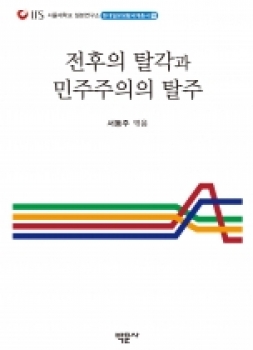
| Author | Seo, Dong Ju ed. | Date | 2020-04-30 |
|---|
Publication date 2020-04-30
Contents
Introduction/ The Historical and Middle Layers of Post-postwar Thoughts
Chapter 1. Post-postwar Thought Associations and Genealogy
I. One Zenkyōtō Generation’s Theory of Democracy ─Focusing on Katō Norihiro’s Postwar Theory
1. Postwar Japan and ‘Democracy’
2. Katō Norihiro’s Ideological Methodology
3. Dismantling 'Mythological Democracy'
4. The Circuits of Democracy Discourse
5. Introduction of Postwar, 0year Globality
II. The Thought of "Defeat" and The Public's Discovery-60year Security Struggle and Yoshimoto Takaaki
1. The 1960s and The Birth of Realism in Life
2. The Thought of 'Self-Deception'
3. The Existence of 'Public=Liver' or The Power of 'Political Indifference'
4. The Liberation of 'Defeat'
III. Cultural Conservatives' Criticism of 'Postwar Democracy' and Dilemma surrounding 'Pro-Americanism' - Focusing on Eto Jun's Postwar History Awareness
1. Eto Jun's Postwar History Awareness and ‘Conversion’
2. Postwar, The Era of 'Loss'
3. From 'Dependent' to 'Affiliate': Whereabouts of Pro-Americanism
4. Between 'USA' and 'Chosun'-'Culture' as The Final Judge
5. Eto Jun's 'Frustration' and 'Heritage'
IV. Subculture Criticism and 'Postwar-Democraticism'-Focusing on Age of Otsuka
1. Subculture and 'Postwar Democracy'
2. 'Postwar Democracy' as 'Democraticism of Words'
3. Criticism and Succession of Eto Jun's ‘Postwar’ Awareness
4. Discovering 'Citizen', 'Native(Dojin)', and Japanese as 'Monkey'
Chapter 2. The Escape of Imagination surrounding Postwar Democracy
V. Shinto(神道) and Postwar Democracy-Focusing on Ashiz Uzuhiko
1. Who is Ashiz Uzuhiko
2. What is Shinto for Ashiz
3. Criticism of the : Focusing on "Emperor, Shinto, Constitution" (1954)
4. Criticism of Postwar Democracy: Focusing on 『The End of Modern Democracy』(1972)
5. Shinto Politics as an Alternative: Focusing on 『Modern Politics and Conscience Issues』(1955)
6. Challenges and Prospects
VI. New Left-wing’s Criticism of the Postwar Democracy and The Rebel Movement -Focusing on The Acceptance of Maoism
1. New Left-wing and Zenkyōtō, Violence, and Play
2. The Irony of 'The Loser'
3. Criticism and Contradiction of Postwar Democracy
4. New Left-wing’s Maoism and Zenkyoto’s The Rebel Movement
5. After New-Left wing
VII. ‘(Post)Postwar Japan's Physical Politics and Democracy-Between Autism and Schizophrenia
1. Pathological World and 'Political'
2. The Origin of 'Body and Personal Division' called Modern Japan
3. (Post)Postwar as A New Body
4. Subject Making and Mask (Persona)
5. Hugging 'Torsion'